Politics
About Andrew Cusack
 Writer, web designer, etc.; born in New York; educated in Argentina, Scotland, and South Africa; now based in London.
Writer, web designer, etc.; born in New York; educated in Argentina, Scotland, and South Africa; now based in London. read more
News
Blogs
Reviews & Periodicals
Arts & Design
World
France
Mitteleuropa
Knickerbockers
Argentina
The Levant
Africa
Cape of Good Hope
Netherlands
Scandinavia
Québec
India
Muscovy
Germany
Academica
A Bill Committee in the Commons
A Bill Committee meeting in one of the richly decorated committee rooms of the Palace of Westminster. The Minister is standing, rattling on in an explanatory defence of his government’s bill. Ostensibly these committees exist so that MPs can examine legislation in line-by-line detail and raise questions about whatever points or aspects they believe might cause problems if enacted.
“The question is that Clause 15 stands as part of the Bill.”
The Chairman, an MP of considerable experience, presides, assisted by a retinue of civil servants. He chews a pen and stokes his brow, frustrated by the boredom of the subject at hand. He is perhaps thinking of the weekend and the extreme unlikeliness that he will get down to the coast, and his sailboat, given the inclement weather.
A Scottish Member rises on a Point and the Minister yields the floor. Concerns are expressed about the precise meaning of Subclause 36 Paragraph C and insinuations made about potential costs. The Minister rises and suggests the Member’s criticism is excessively harsh. He then concedes he may have been imprecise in his explanation of the process involved in Subclause 36 Paragraph C.
The Doorkeeper, absurdly and arcanely attired in white tie, tails, and with the royal arms hanging from a gold chain round his neck, wears thick-rimmed glasses and leans back on a desk in a carefree fashion, blissfully paying little attention to the point the Hon. Gentleman has made in response to the proposed amendment.
“Just for the sake of clarity, we are not now talking about Amendment 13?”
“I have no intention of moving Amendment 13.”
“On a Point of Order then, Mr Chair, is it proper that the Member discuss Amendments 21 and 26 when he is not moving Amendment 13, which is the first Amendment to be considered?”
The Chairman corrects that it is perfectly alright for the Member to discuss whichever amendment he would like.
There are at least eleven civil servants in the room. One on the side hands a paper to another. He reads it and nods approvingly before passing it on to the civil servant next to the Chair. Another Member rises to discuss Amendment 54 Clause C.
“There’s an important role for an independent body to exercise scrutiny over this area and it would be wise for it to have a statutory basis.”
The entire proceedings are overshadowed by the continual sound of shuffling papers. One Member doodles on the day’s order-paper. A journalist leaves. The Member stops doodling and consults his iPhone. Then the Minister is grateful for that point. He is surprised but aware, since he was given this junior ministerial role, by the frequency with which this matter has arisen and has spoken before the relevant Select Committee.
Another Member’s face is illuminated by the glow of the iPad he is leaning over.
“Now before I become too Churchillian,” the Minister continues, “I think we’d better turn to the matter of the Amendments. Now the Honourable Member has, perhaps understandably, raised the point…”
A female Member smiles and shares a jest with one of her party colleagues. The Doorkeeper’s shift ends and he is replaced by one of his bearded confrères. The civil servant beside the Chairman folds a paper and stares unthinkingly into the distance.
“In respect for the Hon. Gentleman’s desire for continuing debate and discussion with the relevant authorities…”
“He hasn’t addressed my point about Subsection 2!”
The portly Doorkeeper moves with surprising adroitness in delivering a note from a Member to a civil servant across the room. The Minister’s PPS hands him a relevant paper. The Chairman smiles in response to one of the Minister’s light-hearted remarks.
“I’m sure the Minister will agree that this is not the beginning of the end but merely the end of the beginning.”
“If only!” a Member interjects.
It is 3:32pm. The MPs will be here for hours yet.
France Marches for Marriage
Led by a provocative comedian, a gay atheist, and a socialist teacher, protest against same-sex marriage draws one million
As many as a million protesters descended upon Paris from every corner of France today to demonstrate their opposition to the Socialist government’s plans to introduce same-sex civil marriage. The Prefecture of Police estimates at least 380,000 participated in the three marches from different starting points that converged at the Champs de Mars in front of the Eiffel Tower. Organisers, however, set up counting stations and claim that, by 7:30pm tonight, over one million protestors had joined the march.
Volunteers charted more than eight hundred vehicles to bring protestors to Paris, while six TGV high-speed trains were reserved for demonstrators. “Had the conditions for chartering trains not been as stringent,” an organiser told Le Figaro “the number could easily have been double.”
“In the freezing cold,” Le Figaro reports, “young, old, and families with children were trying to keep warm waving thousands of pink flags to the jerky rhythm of techno music.”
The entire workforce of the Directorate of Public Order & Traffic was called out to handle the massive demonstration, which forced a Paris Saint-Germain football match to be brought forward. Police believed it would be impossible to secure the area around the Parc des Princes stadium when hundreds of thousands of protesters were expected in the centre of the French capital.
The protest today was organised by the eccentric comedian Frigide Barjot, founder of the Collectif pour l’humanité durable, joined by gay atheist Xavier Bongibault of the association Plus gay sans mariage (“More Gay Without Marriage”), and Laurence Tcheng of La gauche pour le mariage républicaine (“The Left for Republican Marriage”).
The unlike troika claim to have launched “a guerrilla war” against the current Socialist Party government’s proposed same-sex civil marriage legislation. Avoiding the mainstream media, ‘Team Barjot’ went direct to supporters through social media such as Facebook and Twitter, and, countering the government’s branding of same-sex civil marriage as “Mariage pour tous”, named their protest “Le Manif Pour Tous” (‘The Protest for All’), asserting that all children have a right to a mother and father.
If opinion polls are to be believed, the campaign against the proposed law seems to be changing perceptions. From 2000 to 2011, polls showed a steady rise in support for same-sex marriage. In 2012, this percentage began to decline; support for allowing same-sex couples to adopt also fell. Meanwhile, polls claim that 69% prefer same-sex marriage be put to a referendum. (more…)
The Iconography of Party
Taking into account the important aesthetical nature of politics, it might be worthwhile taking a sweep round the political parties to see what their emblems, logos, and symbols look like. (more…)
In Defence of Orbánisation
The silent majority of Hungarians have at last found a voice in the Fidesz party – and the European Commission don’t like what they are hearing.
by ALEXANDER SHAW in Brussels
In under two years, Viktor Orbán’s regime has reduced the Hungarian budget deficit, reduced personal income taxes, returned the GDP to growth and proclaimed sovereign primacy over supranational diktats. Adopted at the beginning of this year, Fidesz’s new national constitution finally overthrows the Communist era law of 1949. Hungary is the last former East Bloc nation to have achieved this. It is hardly surprising, therefore, that 300,000 Hungarians marched to support their government when the reforms came under fire from the EU in January. It was the biggest demonstration in Hungary since the regime change. The message was clear: Fidesz’s democratic mandate is as mighty as ever and Hungarians want sovereignty. (more…)
‘Called Before the Tribunal of Reason’
Some Essays of Pierre Manent in English
I’VE BEEN ON a Pierre Manent kick recently, whom a friend in Paris describes as “a giant, grossly under-rated in the Anglophone world and treated with considerable disdain even in France on account of not being a prisoner of ephemeral conventional wisdom. ”
Given the current penitential season, it might be worth reading Manent’s “Reason and Faith: A Lenten Reflection”. This paragraph was one among the many that struck me with its accuracy:
Christian faith, for its part, accepts being called to appear before the tribunal of reason. It is distinctive of the Christian God to leave man to his own counsel, and to put the fulfilment of the plan of salvation as it were at the mercy of human freedom. This is why Christianity is not a law, but a faith. This is why the Bible is not a teaching dictated by heaven like the Koran. It is a chronicle, full of detours, of an often-broken and ever-renewed covenant between divine goodness and human freedom.
Much of Manent’s pondering is on the realm of political philosophy. His 1999 essay “The Return of Political Philosophy” explores the death of political philosophy over the course of the twentieth century, while his lecture “Current Problems of European Democracy” examines the depoliticisation of European societies. “The Greatness and Misery of Liberalism” is also worth a read.
Hungary Reasserts Sovereignty
Deputy PM Navracsics asserts to shocked Commissioner that Council of Europe “cannot impose anything which runs counter to our constitution”
Hungary yesterday declared its sovereign primacy over the EU. In a heated dialogue between Tibor Navracsics and Commissioner Neelie Kroes, the Hungarian deputy PM staidly remarked that his country would not impose legislation which was contrary to its new constitution. The packed committee room gasped in horrified awe. Kroes was visibly furious as she stormed out, expressing her usual ‘grave concerns’ about Hungary.
Kroes had obviously been banking on Navracsics’s compliance with the Council of Europe’s recommendations, EU member states being bound to comply with the Council of Europe’s Fundamental Charter of Human Rights under the Treaty of Lisbon. The Hungarian government is under scrutiny from the EU for the possible breach of various articles of the Charter. When asked directly where his priorities lay in implementing recommendations, however, the founding member of the ruling Fidesz party stated “I’m a Hungarian member of parliament and I have sworn allegiance to the constitution of Hungary.” (more…)
Adding to Ulster’s Party Panoply
Tim Montgomerie’s ConservativeHome website reports that the Conservative & Unionist Party is setting up its own party in Northern Ireland, following the failure of its collaboration with the Ulster Unionist Party. At the last election, the Tories ran a joint ticket with the UUP under the name ‘Ulster Conservatives and Unionists – New Force’ which fell rather flat.
In the years before the party system was as solidly formalised as it now is, Unionist MPs took the Conservative whip at Westminster but today the SDLP is the only Northern Irish party which takes the whip of a British party (in its case, Labour). Gradually official Unionists found themselves increasingly challenged by upstarts, which evolved into the formal division between the Ulster Unionist Party (moderate liberal-conservative unionists) and Paisley’s Democratic Unionist Party (hardcore conservative unionists).
The decision to start a separate Conservative & Unionist party for Ulster is a curious one, as it can only further split the Unionist vote, already divided between the dominant DUP and the fading UUP. This is at least simpler than in the 1990s and 2000s, when the vote split between these two and smaller Unionist groupings like the UK Unionists, the Progressive Unionist Party, the Ulster Democratic Party, and the Northern Ireland Unionist Party.
My favourite Unionist Party, however, was that which dominated the political scene in the Punjab from the First World War until Partition. It was primarily the instrument of the Muslim, Hindu, and Sikh gentry of the province, and counted three holders of knighthoods — Sardar Sir Sikander Hayat Khan, Sir Fazli Husain, and Rao Bahadur Sir Chhotu Ram — among its founders. Alas, with the increasing enmity between the Hindu and Muslim populations of India, its existence became unsustainable, and even the Punjab Province itself was split between Pakistan and India at independence. Sic transit gloria mundi!
Opening Parliament Down Under
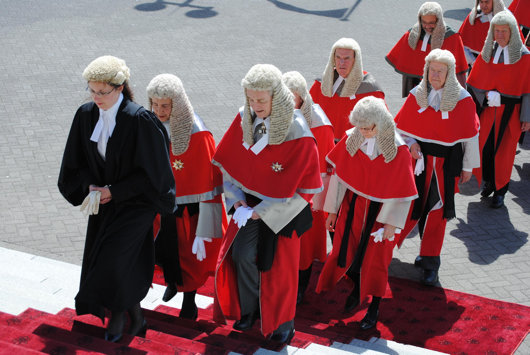
I’m a fan of state openings of parliament, so it might be a surprise that I’ve never been to one. I did see some of the practice run-through for the State Opening in Cape Town (which involves a delightful parade of the Cape Town Highlanders and other units from the Castle to Parliament) but unfortunately a social occasion kept me from the actual opening itself. As my luck would have it, I managed to return to live in Blighty again the one year the blasted Government decided not to have a State Opening. Roll on, 2012! Anyhow, down in the Antipodes, the New Zealanders have just had their State Opening of Parliament in the realm’s capital city of Wellington. (more…)
Burn Baby Burn!
A Burning-in-Effigy at Exposes the Cowardices of Tomorrow’s Politicians
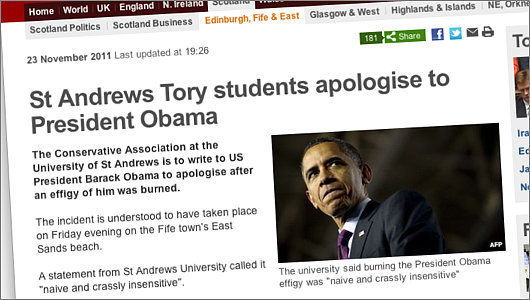
I cannot condemn this in more stringent terms. The Tories at the University of St Andrews have apparently burnt Barack Obama in effigy and then backtracked with all manner of pussyfooting around and the standard issue of apologies. Burning in effigy is a perfectly legitimate form of political expression and has been verified by centuries of tradition.
What’s more, I suspect there’s a bit of the old racism behind the apologies: would anyone have bat an eyelid if Mr Obama’s predecessor had been burnt in effigy by students? I, for one, would have happily joined in both effigy-burnings. The more effigies burnt the merrier. Chesterton remarked “It is terrible to contemplate how few politicians are hanged”, and I would suggest effigy-burning is a potentially more wholesome if less efficacious alternative.
If you’re going to burn an effigy, burn an effigy and then stick with it. But the weak-kneed, shilly-shally Tories always want to engage in a bit of old-school fun before hoisting up the white flag and issue an “unreserved public apology”. Rank hypocrisy of the highest order! Ye cannae have yer cake an’ eat it, too!
California Floreat
As Alex Massie writes over on his Spectator blog, Governor Jerry Brown of California “has taken to slapping down the kind of mollycoddling absurdities much favoured by that state’s woeful legislature”. “Governor Moonbeam”, as he is nicknamed, recently vetoed a bill proposing to criminalise skiing or snowboarding by children without a helmet.
“While I appreciate the value of wearing a ski helmet, I am concerned about the continuing and seemingly inexorable transfer of authority from parents to the state.” As His Excellency points out, “Not every human problem deserves a law.”
When I was a child, skiing with a helmet was unheard of; but then we were taught to ski without even poles.
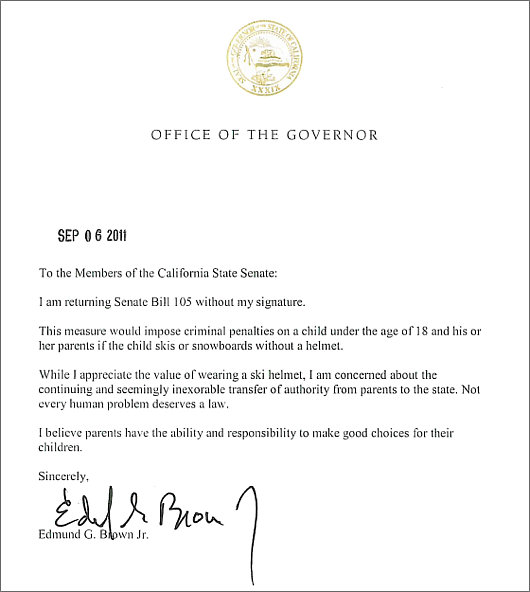
Too moderate to defend the defenseless
Betty Ford was ‘a strong female voice for moderate Republicanism’
Over at Telegraph Blogs, Tim Stanley posts the following about Betty Ford, the First Lady of the United States who died recently:
Betty was a strong female voice for moderate Republicanism. It was the Republicanism of New England suburbs, Wall Street brokerage firms, golf clubs, yacht houses, East Coast fraternities, drunken bridge games and James Stewart. It was wrong on so many things, but it was gentle and sophisticated and meant well.
The suburbs, the Wall Street firms, the golf clubs, yes, but also the abortion clinics. Mrs. Ford was an ardent supporter of a woman’s right to kill her child. So many evils are easily excused because they were gentle, sophisticated, and meant well.
Senator Eugene McCarthy: A Kirkian Anecdote
Russell Kirk, the great St Andrean and American man of letters, relates this anecdote in his article “Will American Caesars Arise?” (Modern Age, Summer 1989):
The most interestingly complex of all recent aspirants to the presidency, [Senator Eugene] McCarthy obdurately called himself a liberal during years when that appellation was sinking swiftly in popular favour – although he abjured all forms of liberalism earlier than Franklin Roosevelt’s. (During the past few years, as he now remarks, he has employed the word ‘‘liberal’’ as an adjective merely.) In his political theories, actually, McCarthy has been a conservative: He declared long ago that Edmund Burke was his political mentor, and no one has more warmly praised Tocqueville. He has read seriously and written intelligently. In the White House – per impossibile – he might have turned the most imaginatively conservative of Presidents.
Or perhaps not. Once upon a time I had an assistant who was a graphoanalyst, an expert on handwriting. Having examined a specimen of Senator McCarthy’s handwriting, my assistant pronounced him rebellious, a hard master, and desirous of power. A touch of Caesar even in Caesar’s adversary? However that may be, McCarthy’s only considerable assertion of power was his unseating of President Johnson by running a good second in the New Hampshire primary of 1968.
A congenital no-sayer, Eugene McCarthy never ran with the hounds. He was candid and witty always. He and I first met as debaters before a large audience, in Boston. After this exchange, sponsored by the Paulist Fathers, a reception was held for us. Up to Senator McCarthy came a zealous young Paulist, inquiring, “Senator McCarthy, don’t you think that Jack Kennedy is the finest president this nation ever has had?” (This occurred during the first year of the Kennedy administration.)
“No,” said McCarthy, unsmiling.
Although taken aback, the Paulist returned to the charge: “But surely you agree, Senator, that President Kennedy has given this nation a new hope, a new vigor, a sense of moving forward toward great things?”
“No,” said Eugene McCarthy.
The Paulist persisted: “But of course you’ll agree with me when I say, Senator, that the Kennedy family have brought to our life a culture, a refinement, a meaningfulness, that we have not known before.”
“No,” said Eugene McCarthy.
“But – but Senator McCarthy, surely Jack Kennedy is a very nice man personally?”
Eugene McCarthy turned his back upon the Paulist and slowly walked away. He knew how to say no, he was not ensnared by cliché and slogan, and he had a poet’s attachment to truth.
Les fondements de notre civilisation occidentale
« Les fondements de notre civilisation occidentale sont chrétiens ; le respect du christianisme est une condition sine qua non d’une droite qui veut conserver non seulement la prospérité économique, mais ce qui est au fondement de toute prospérité durable : le souci du bien commun, le respect de la loi naturelle, le sens de la justice. »
The latest issue of Égards, the premier journal of traditional conservatism in Quebec, contains an interesting analysis of the current situation faced by the various streams of the centre-droit spectrum in the province. I am, however, very much against the perpetual organisation-founding that goes on in political circles. There seems to be a belief that, when in doubt, start a new organisation, but this is precisely what the author, M. Décarie, proposes.
Solution «N» for Flanders?
Matthias Storme’s thoughts on keeping Flanders in the E.U.
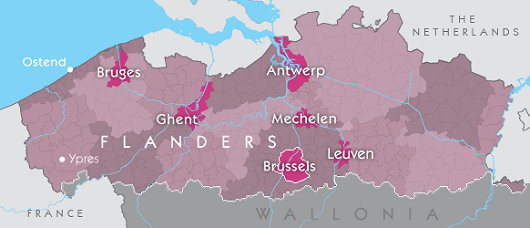
PURSUANT TO OUR previous discussion of the dissolution of the confederal Hollandic archipelago in the Caribbean, the ever-interesting Flemish philosopher & university professor Matthias Storme suggests an interesting solution to the Belgian question. Opponents of Flemish secessionism frequently argue that should Flanders gain independence from Belgium, it would not automatically continue its membership in the European Union and would be forced to seek re-admission on its own. Professor Storme posits what he calls Solution «N», which has its basis in the Charter for the Kingdom of the Netherlands and Article 355, Paragraph 3 of the Treaty on the Functioning of the European Union. (more…)
A Pro-Life Politico in Argentina
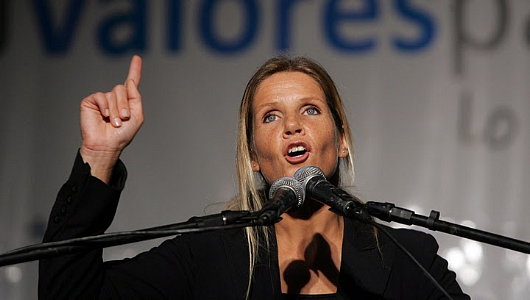
In the Sunday after-church tea-drinking circles of Manhattan, much thought and disputation was provoked by Damian Thompson’s recent revelation that the senator-elect from Florida, Mr. Marco Rubio, is in fact an evangelical Protestant despite his office claiming he is a Catholic. Word comes from Argentina about a member of parliament named Cynthia Hotton, a brazen defender of the right to life and solidarity with the unborn. (more…)
Dodgy ‘knighthood’ for a dodgy lady
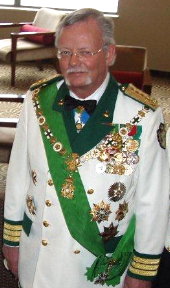
An example of the ‘Lazarus bling’, more medals than you can shake a stick at.
From the blog of John Smeaton we read that the former Irish president (and genial enemy of all that is good and holy) Mary Robinson has received a ‘knighthood’. Last month she was invested as a Dame in the self-styled ‘Order of St. Lazarus’, a fake order of knighthood. The group claims links to the old Order of St. Lazarus of which the last remnants faded away in the 1780s.
The current ‘Order’ was founded as a fake order of knighthood in 1910 by the confidence trickster Jean-Joseph Moser, and has grown by perhaps surprising leaps and bounds in the past few decades, taking into account P. T. Barnum’s famous maxim about a sucker being born every minute. The group has split into various factions and it has become notorious for having members in its ranks who don more metal “bling” than rap stars or Soviet generals.
The so-called Order of St. Lazarus exists throughout Europe and the Spanish- and English-speaking countries abroad, including the United States. The French branch of St. Lazarus was forced by the Grand Chancellor of the Legion of Honour to cease claiming to be an ‘order’, and members of the Order of Malta are forbidden from participating in St. Lazarus’s activities.
“The Order’s pretensions have been strongly condemned by the Holy See as aiming to replace ‘the legitimate forms of chivalric awards’,” according to Guy Stair Sainty, the acknowledged expert on these somewhat arcane affairs. Nonetheless, Guy points out that “supporters of Saint Lazarus include the heads of a handful of great noble families and, over the years, several leading Churchmen and Cardinals”.
“The Order of Saint Lazarus, although it is to be complimented for its considerable charitable efforts (notably in Germany), need not pretend to an historical continuity to which its claims, at the very least, are unsubstantiated,” Guy Stair Sainty concludes. “Were it to assume the character of a private association, founded in 1910, to emulate the traditions of the ancient crusader Order, it could deflect much of the hostility it has attracted… It would be much more successful and be more readily welcomed into the wider community of international humanitarian bodies, however, if it was to permit an honest appraisal of its origins.”
Interesting Things Elsewhere
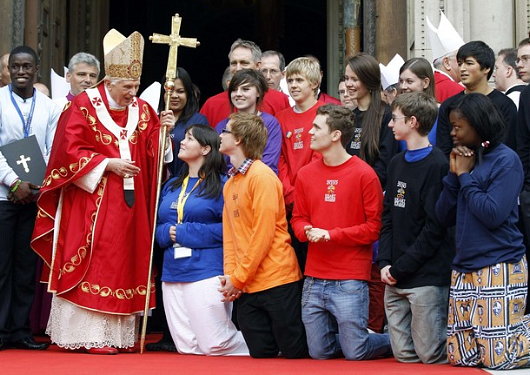
Benedict and Britain
The papal visit began in Scotland, and the smaller setting (Scotland has just five million people, fewer than London alone) proved a wiser starting point of the pontiff’s trip to Great Britain. “Would the first day have been the success it was if it had taken place in England?” asked William Oddie. “Would the papal chemistry have worked so soon in London, that vast and engulfing megalopolis, if the reception by Her Majesty had taken place in the impersonal splendours of Buckingham palace rather than in that ancient architectural wonder Holyrood house (whose very stones are a testimony to its Catholic origins) and if the Popemobile ride through the streets afterwards had been down the Mall?”
Damian Thompson has argued that the papal visit has proved a triumph for Benedict and a humiliation for the secular-humanist crowd. The Daily Telegraph blogs editor and Catholic Herald editor-in-chief says that the Pope’s natural shyness has worked to his advantage, while the former Spectator editor Dominic Lawson argued in the Independent that Benedict’s unpolitical nature gives him a popular appeal.
The volume and biliousness of the media’s campaign against Benedict XVI has actually backfired and turned the lukewarm into pope-welcomers (like Kate Hoey MP, reports Christina Odone). Another blogger reported the influence a television programme produced by the gay activist and sometime paedophilia sympathiser Peter Tatchell that was broadcast just before the Pope’s arrival:
‘Are you going tomorrow?’ I asked. ‘Yes, I am,’ she replied. ‘I wasn’t going to at first, because it’s a long day, but when I saw that rubbish last night on the telly, I changed my mind. I’m don’t care if I die there; I’m going.’
Meanwhile Mark Dowd, another homosexual, was determined to be even-handed in his documentary “Benedict: Trials of a Pope”, and his broadcast was well-received. The filmmaker wrote in the Catholic Herald “when you have to make a one-hour programme on one of the most clever and gifted people on the planet you have to look behind the headlines and the angry rants on the blogosphere. In short, you have to do justice to the man as best as you can.”
Hilary White had a chat with barrister and Catholic Union chairman Jamie Bogle, who argued that the visit has taken the wind out of the sails of Benedict’s enemies.
“Jamie also pointed out that the protesters were having a bit of fun with the numbers,” Hilary writes. “A friend in Vancouver said that 25,000 turned out for the demonstration. The National Secular Society said it was ‘between 10 and 12,000’. But Jamie told me he had spoken with some of the cops present, and they said it was no more than 2,000.”
It was like a scene from 1984
Atheist Brendan O’Neill reported being disturbed by the anti-papal demonstrators, reporting that there is “a sharp authoritarian edge” to the radical pope-haters. “Things turned ugly outside Downing Street when Terry Sanderson of the National Secular Society branded the pope an ‘enemy of the state’, giving rise to the cacophonous chant: ‘GO HOME POPE, GO HOME POPE.’ It was like a scene from 1984. I have been on many a radical demo that has challenged the branding of some group or individual as ‘enemies of the state’; but this is the first radical demo I’ve been on where the protesters themselves demanded the silencing and even expulsion from Britain of someone they decreed to be an ‘enemy of the state’. Even one-time ‘enemies of the state’ – the so-called queers and the old left – were using that criminalising phrase, that piece of political demonology, to chastise the pope. It was the world turned utterly upside down.”read more
Also: The campaigners against the pope’s visit have more in common with the fanatical Inquisitors of old than with Enlightened liberal humanists, says Frank Furedi.
The conservative case for rail
File this one under “things we always knew and are glad someone agrees”: the dissident conservative fortnightly The American Conservative presents a symposium of articles about getting the USA back on the rails. William Lind attempts to destroy the myth of public-transport-hating conservatives while attacking the rampant subsidisation of federal highways. Former Milwaukee mayor John Norquist says the Right shouldn’t surrender the cities to the Left. Glen Bottoms does the numbers on the return to rail and tries to figure out how much it will cost. Finally, John Robert Smith argues that there’s still some life in America’s Main Streets. Christopher Leinberger discusses how private development can fund public infrastructure. read more
The Thomist constitution
St. Thomas Aquinas, the “Dumb Ox”, stated that “all should take some share in the government: for this form of constitution ensures peace among the people, commends itself to all, and is most enduring”. Aelianus muses on a Thomistic view of government, explores the pros and cons of monarchy, aristocracy, democracy, and ponders the political position of the family in society. read more
Swedish under threat in Finland
Swedish was historically the language of Finland’s nobility and intelligentsia, as well as of the country’s ethnic Swedish minority — Finland’s first president and greatest hero, Field Marshal Mannerheim, could barely even speak Finnish. But while the Scandinavian land is still officially bilingual in education and government, the 5.5% of the population who are Swedish-Finns is increasingly viewed as “the world’s most pampered minority”. read more
The Südtirol success story
Amid the warnings of doom and gloom ahead for the Italian economy, one province has almost full employment and a healthy economy, not to mention a governor who has ruled for over twenty years. “We are living in the promised land,” — Südtirol. read more
Zuma in Orania
President is Welcomed at Afrikaners-Only Enclave in Northern Cape
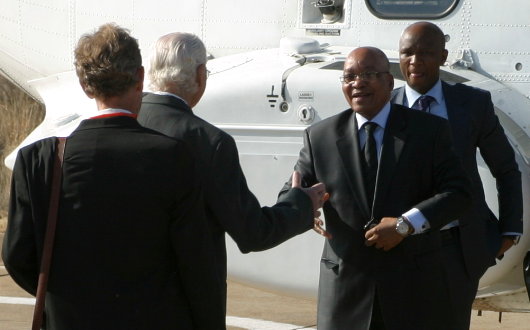
President Zuma yesterday paid a ‘goodwill visit’ to the whites-only Afrikaner enclave of Orania in the Northern Cape. The trip was prompted when Pres. Zuma received word that the town’s founded Prof. Carel Boshoff IV, was in poor health. Orania was founded in 1990, some months after whites voted to dismantle apartheid, as a place where Afrikaner self-reliance could be practiced and cultural heritage preserved. The town has pioneered various agricultural and ecological projects, and in 2004 started its own local currency, the Ora, which is equal to ten rand. (more…)
Zuma: Government Will Mediatise Six of South Africa’s Monarchies
Six of South Africa’s thirteen monarchies are to be mediatised, the country’s president announced in July. A report by the Commission on Traditional Leadership Disputes and Claims of the South African government concluded that the six dynasties had been raised from chiefdoms to monarchies by the apartheid government for purely political reasons and suggested that their government funding and recognition be ended. President Zuma said the aim of the move was to correct “the wrongs of the past” but that no one was being accused of collaboration with the apartheid authorities. The six incumbent rulers will retain their styles and dignities while their successors will revert to the rank of princely chiefs.
“We have been waiting for this decision for a long time,” Khosi Fhumulani Kutama, the Chairman of the National House of Traditional Leaders told the media. “It is important that people accept it not only for the institution of traditional leadership but for the whole country.”
But the indications so far are that the six monarchies will take the government to court in an attempt to forestall the demotion.
Up to this point, the most significant spate of mediatisation was during the Napoleonic era, when Talleyrand arranged the demotion and reorganisation of conquered German lands.
Douglas Murray: In Order to Prevent the Use of WMDs, We Must Use WMDs
The slightly camp Old Etonian atheist neo-con Douglas Murray got himself into a bit of trouble recently when he and Baroness Deech unleashed a splenetic rant against Scotland and the Scots on BBC Radio 4. As head of the HFEA, Baroness Deech presided over the deaths of an untold number of humans in the embryonic stage of development, but it turns out that Mr. Murray (who is Scottish-born, curiously) has advocated hypothetical wholesale slaughter.
In 2007, Mr. Murray helped compose Towards a Grand Strategy for an Uncertain World: Renewing Transatlantic Partnership ostensibly written by Gen. Dr. Klaus Naumann (former Bundeswehr Chief of Staff), Gen. Prince John Salikashvili (Georgian prince and former U.S. Chairman of the Joint Chiefs of Staff), Field Marshal the Lord Inge (former U.K. Chief of the General Staff), Adm. Jacques Lanxade (former Chief of the French Navy), and Gen. Henk van den Breemen (accomplished organist and former Chief of Staff of the Dutch military).
This interesting document made a number of recommendations, the most intriguing of which is the suggestion that NATO should be prepared to make a pre-emptive nuclear strike… in order to prevent the use of weapons of mass destruction (“WMDs”) such as, er, nuclear weapons. You read that correctly: in order to prevent the use of WMDs, NATO should be prepared to use WMDs. You couldn’t make it up!
Search
Instagram: @andcusack
Click here for my Instagram photos.Most Recent Posts
- Letters Patent May 8, 2024
- Bicycle Rack April 29, 2024
- Burns Tower April 19, 2024
- Patrick in Parliament March 18, 2024
- Articles of Note: 13 March 2024 March 13, 2024
Most Recent Comments
Book Wishlist
Monthly Archives
Categories


